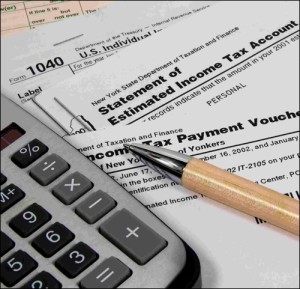Late last year Congress signed into law the most massive changes in tax reform (Tax Cuts and Job Act – TCJA) since 1986. It is important to take a quick break from holiday festivities to analyze your tax picture so you are not surprised or terrified next April 15. If your return is prepared by a tax professional, it would behoove you to set up a meeting before year end to see how the tax law changes affect your 2018 tax return.
Standard deduction increases
No matter your filing status, the standard deduction pretty much doubles in 2018. If your itemized deductions don’t exceed the amount indicated below for your filing status (To determine, check your 2017 Schedule A total), your taxes will be simplified. You will no longer have to compile all that extraneous data – medical, charitable, property taxes, DMV fees, employee business expenses, investment fees, etc); you will simply take the standard deduction: Single and Married Filing Separately — $12,000; Married Filing Jointly — $24,000; and Head of Household — $18,000
Personal exemption eliminated
Under the tax reform, taxpayers can no longer claim the $4,050 personal exemption for themselves or each of their dependents. The government gives with one hand and slaps with the other. But read on for some more good news.
Child tax credit rises
The Child Tax Credit increases in value from $1,000 to $2,000. The tax reform bill also introduces a new $500 credit for non-child dependents. This takes some of the sting out of the removal of the personal exemption.
State and local capped
Taxpayers can deduct up to $10,000 in state and local income taxes. Previously there was no cap. This affects taxpayers who pay significant amounts in state income taxes and/or property taxes. Check your 2017 Schedule A to see what your total was for state tax deductions to see if you are affected by this change.
ACA individual mandate repealed
Beginning in 2019, individuals who choose to go without healthcare coverage for the year will not have to pay tax penalties. The penalty is still in play for 2018, so prepare to pay if you did not have health insurance and if you did not qualify for the exemption.
Mortgage interest deduction drops
Individuals who purchase a home in 2018 can only deduct interest up to $750,000 in mortgage debt (previously $1 million). The interest deduction on home-equity loans is eliminated.
Business-related deductions eliminated
Employee Business Expenses, Tax Prep Fees, Investment Fees: effective for 2018, you may no longer deduct these expenses on Schedule A Itemized Deductions. If you have a large amount of unreimbursed employee business expenses that you normally deduct, you may want to negotiate with your employer. If the employer can restructure your pay to include payment for these expenses, they can take the deduction and you may be able to enjoy some of these expenses as a tax-free fringe benefit. It could be a bit tricky, so I would suggest discussing it with your tax pro as well as your employer.
There were many other huge changes enacted that apply to alimony, self-employed business expenses, business income, fringe benefits, etc. Some take effect in 2018, some in 2019. Consult with your tax professional to determine how these changes will be reflected on your 2018 tax return and beyond.





Be First to Comment